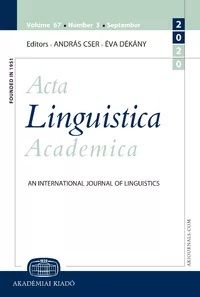The (non-)finiteness of subordination correlates with basic word order: Evidence from Uralic
The (non-)finiteness of subordination correlates with basic word order: Evidence from Uralic
Author(s): Katalin É. KissSubject(s): Finno-Ugrian studies
Published by: Akadémiai Kiadó
Keywords: Uralic; non-finite subordination; OV-to-VO change; Final-Over-Final Condition (FOFC); Minimize Domains
Summary/Abstract: This paper aims to answer why the Uralic languages use, or used until intensive contacts with Indo-European languages, only non-finite subordination. It argues against regarding the evolution of finite subordination language development, showing that languages with non-finite subordination and parataxis have the same expressive power as languages with finite subordination. It claims that non-finite subordination is a concomitant of SOV word order, and the growing proportion of finite subordination in the Uralic languages from east to west, and in the history of Hungarian is a consequence of the loosening of the SOV order and the emergence of SVO. The paper examines two hypotheses about the correlations between SOV and non-finite subordination, and SVO and finite subordination, the Final-Over-Final Condition of Biberauer, Holmberg & Roberts (2014, etc.), a formal principle constraining clausal architecture, and the Minimize Domains Principle of Hawkins (2004, etc.), a functional principle of processing efficiency. The two theories make largely overlapping correct predictions for the Uralic languages, which suggests that the Final-Over-Final Condition may be the syntacticization of the condition that ensures processing efficiency in SOV and SVO languages.
- Issue Year: 70/2023
- Issue No: 2
- Page Range: 171-194
- Page Count: 24
- Language: English

